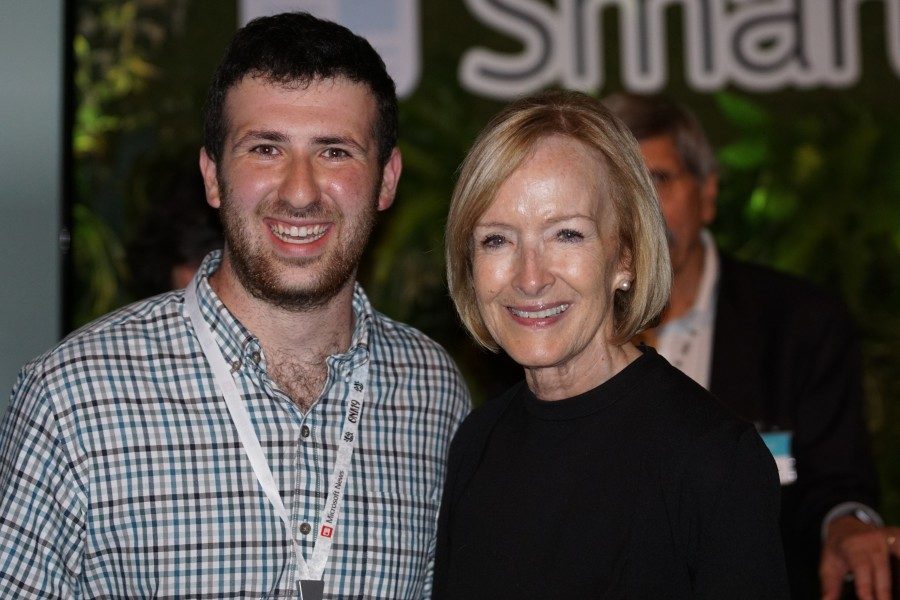Faith for the future: We can save journalism with help from older generations
Josh Axelrod is The Hullabaloo’s Views Editor and a member of the Online News Association Student Newsroom and Innovation Lab.
Journalists, members of the Hullabaloo staff included, tend to be apocalyptic about the future of journalism. We enjoy moping around and bemoaning the end of print journalism, lack of advertising revenue and the continued volatility of the industry.
It’s time to start thinking optimistically.
This past week, New Orleans hosted the Online News Association’s annual conference. Journalists from across the country, representing newsrooms, nonprofits and universities flocked to our city to share tools and discuss what lies ahead.
The prognosis: things are not as bleak as they seem.
Judy Woodruff, host of the PBS NewsHour, addressed ONA attendees at the Crescent City Brewhouse with this theme in tow.
“My message to you tonight is that there is no reason to be discouraged,” Woodruff said on Sept. 12. “Why not? Because never before have the American people needed the kind of work that you are doing day in and day out in your community, in your state, in your corner of this country.”
Her message to young journalists: "We are cheering you on, we want you to keep it up… What matters is the work we do day in, day out… the fact that I can come to work everyday and work on stories that I’m still interested in is pretty amazing
— Josh Axelrod (@j0shaxelrod) September 13, 2019
Her talk mirrored the general tone of the conference — a feeling that the future is uncertain, but our work as journalists is crucial and will continue, with young journalists emerging to carry the torch. As outlets fumble around in the dark, trying to find new sources of revenue and experimenting with different platforms and tech, they get more right than wrong.
Woodruff nicely encapsulates the fastidious and thoughtful journalism being produced in 2019. Often lost in the circus of cable news and competing with polarizing personalities on either side like Rachel Maddow and Ann Coulter, Woodruff is stately, methodical and measured. A veteran journalist, she appears on PBS’s flagship news program each evening, delivering well-sourced and impactful news to the American public.
Thank YOU @j0shaxelrod for caring enough about good journalism to show up and share your thoughts. Hang on to that passion for telling the stories people need to know about.
— Judy Woodruff (@JudyWoodruff) September 13, 2019
The conference’s award ceremony provided more confirmation of journalism’s auspicious future. Every winning project demonstrated a realization of journalism’s credo — organizations holding the powerful accountable and telling stories that make a difference in people’s communities.
The New York Times won an award for its visual investigation of a border shooting in Gaza. With high-definition drone footage, the Times recreated the scene where an innocent life was taken and elicited a response from the Israeli military, prompting a criminal inquiry.
Over the course of 16 months, NJ Advance Media built New Jersey’s most comprehensive database of police use of force after filing 506 public records requests and analyzing 72,607 incident forms. The project earned a response from New Jersey Attorney General Gurbir Grewal, who promised wholesale reform on accountability.
Thank you to @ONA for recognizing our 16-month project, The Force Report. Find the reporting, explanations and database at https://t.co/YDcsQU0zIf. #ONA19 https://t.co/WtbfYv4mOo
— njdotcom (@njdotcom) September 15, 2019
The Trace, a nonprofit covering gun violence, worked with the Miami Herald and McClatchy to empower student journalists. The newsrooms asked 214 student reporters, many from backgrounds underrepresented in media, to write obituaries and victim profiles of the lives lost in Parkland.
These projects represent the best of the industry and predict a future filled with creative storytelling and consequential reporting. As a young journalist hoping to enter the field amid a steady stream of voices predicting the end of journalism and impending disaster, the positivity and celebration of powerful work at ONA was contagious.
Though uncertainty looms, beacons of light in our crucial-as-ever industry continue to lead the way, inspiring a new generation of truth seekers. Woodruff left journalists at her talk with a call to action. From our tiny-but-mighty campus newspaper to the hundreds-large newsrooms across the country, we must internalize her call and embrace the bright future ahead:
“When you go back to your respective newsrooms, I hope you will say to the young people — if they’re questioning whether this is the business they should stay in … that we need them, we need their ideas, we need their energy, we need their curiosity, we need them to turn over stones, and knock on doors and just keep on pushing and pushing information because that, ultimately, is what is going to keep this country strong.”
Your donation will support the student journalists of Tulane University. Your contribution will allow us to purchase equipment and cover our annual website hosting costs.





Leave a Comment